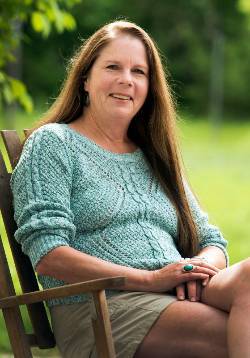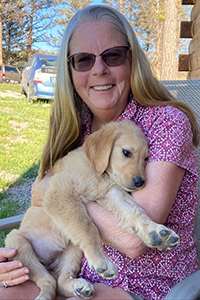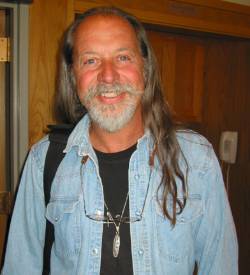Thank you, Professors Corbett and Tatum
Professors Julia Corbett and Steve Tatum are retiring this summer. The two faculty members were instrumental in the shaping of the Environmental Humanites Program. Both of them answered a few questions I sent them at the end of their final spring semesters.
Dr. Julia Corbett
Julia Corbett, who describes EH as her ‘heart home’ ♥ has been affiliated with the Program since 2007 when she served on EH student supervisory committees and in 2010, she received the EH Research Professorship. Her book Out of the Woods: Seeing Nature in the Everyday arose from that research award. Julia was officially appointed in EH in 2017 and taught environmental communication seminars and incorporated student research and feedback into her current monograph Communicating the Climate Crisis: New Directions for Facing what Lies Ahead. Julia was also a Professor in the Department of Communications.
CP: How did your interest in Environmental Humanities develop?
JC: I remember it rather clearly. I’d just finished a fancy time-series analysis (with a statistician co-author, no less) about the drivers and followers of climate change news coverage over several decades - tons of data points, and very complex to interpret. And it just hit me: in the larger, dire picture of climate change, this kind of work will simply not engage the broad, global audience that this crisis needs. The humanities are what can provide the context, the emotion, the heart and soul for what this crisis and all environmental problems need. I left my social science quantitative research and focused on book chapters, narrative nonfiction, and books.
About the same time (around 2007-8), I was asked by several EH students to serve on
their committees, those students who had taken one of my environmental communication
classes. Then I was granted the EH Research Professorship from 2010-12 to work on what eventually became Out of the Woods: Seeing Nature in the Every Day (2018), which cemented my involvement even deeper. My wonderful EH colleagues valued
and appreciated my writing to public audiences. In that way, EH always felt like my
home on campus.  It was the EH events and speakers and writers and classes that spoke to me and inspired
me. The eclectic and talented cohorts of students have been a pleasure to work with
over the years. And my all-time-favorite class of my entire teaching career was Ecology of Residency (EHUM 6103) at Taft-Nicholson Center; blending science and natural history with writing is the best of all possible worlds.
It was the EH events and speakers and writers and classes that spoke to me and inspired
me. The eclectic and talented cohorts of students have been a pleasure to work with
over the years. And my all-time-favorite class of my entire teaching career was Ecology of Residency (EHUM 6103) at Taft-Nicholson Center; blending science and natural history with writing is the best of all possible worlds.
CP: What next?
JC: Upon retirement, I plan to continue that blending and writing. I’m moving this summer to Corvallis, Oregon, a small college town in the Willamette valley, with my new golden retriever puppy, Jasmine. I’m happy to return to the Pacific Northwest where I lived in my 20’s and where most of my relatives are. I will still summer in my western Wyoming cabin and get my fill of high, dry, blue, and wide open.
To stay on top of Julia’s work, check out her website.
Dr. Stephen Tatum
Stephen Tatum, Professor of English, was instrumental in the founding of the EH Program - the first in the country - and served as Director of the program from 2008-2014. He designed and taught most of the EH core classes and shepherded more than 45 master’s students to earn the first Environmental Humanities degrees. He’s the author of countless articles and five books including Morta Las Vegas: CSI and the Problem of the West and In the Remington Moment.
I asked him to describe his connection the program and scholarship:
ST: I was appointed Director of Environmental Humanities by then-Dean Robert Newman to take over from Mark Bergstrom. I also was Chair of a College of Humanities faculty committee appointed by Dean Newman back at the beginning of things to explore the feasibility of developing a program such as EH. The faculty committee, all of whom played important roles in the program’s history, decided it was feasible and a timely idea, wrote a report to Dean Newman recommending the EH Program be established, and Mark, then Associate Dean as well as a member of the committee, shepherded the proposal through all the administrative stages.
Other than respecting the call to service, my interest in the program and in the environmental humanities more generally was a natural extension of my career-long interdisciplinary specialization in the place-based literatures and cultures of the US West. It has been a distinct privilege and a highlight of my career at the University of Utah to have been involved in the program’s evolving history (especially the field trips!) and to have been in the presence of and to have learned from so many smart, creative, collegial, and committed students and faculty, as well as all the visiting faculty and all the friends of the program in the university, local, and national community.
As for the future, well, I would hope to continue being blessed with days spent, as Gary Snyder put it once upon a time, “on the path, off the trail.”
Environmental Humanities wishes the best to Steve and Julia and appreciates their enormous contributions to our Program.

